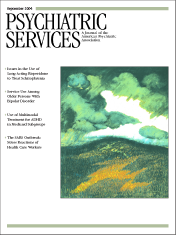Living Outside Mental Illness: Qualitative Studies of Recovery in Schizophrenia
The concept of recovery is having greater influence in the mental health field. Recovery is mentioned prominently in the President's New Freedom Commission Report on Mental Illness (1) as well as in numerous recent professional and consumer publications.
Larry Davidson, Ph.D., the author of Living Outside Mental Illness: Qualitative Studies of Recovery in Schizophrenia, is an associate professor of psychology in the department of psychiatry at Yale and has a longtime interest in the experiences of persons with schizophrenia. In this his latest book he proposes an emerging model of recovery that draws heavily on the value of the professionals attending to such experiences. He bases his thesis primarily on the work of Edmond Husserl, the founder of phenomenology.
From Husserl's perspective, a person's knowledge is limited to what can be ascertained through experience. Davidson asserts that, phenomenologically speaking, there are compelling reasons to approach the study of schizophrenia by focusing on the subjective experiences of persons with this disorder. He uses the term "qualitative methods" to refer to this approach, contrasting these with the more traditional, scientifically objective "quantitative" methods.
Davidson unfolds his argument in a lengthy, theoretical introductory section. Although he indicates that he has attempted to limit his use of abstract philosophical terms, some readers may still have a little difficulty appreciating what the author describes as "this exegesis of the Husserliana."
Having laid out the justification for his "qualitative" approach, Davidson proceeds to explain and elaborate on his terms "inside schizophrenia" and "outside schizophrenia" and to recommend various techniques for eliciting and understanding patient narratives, which he sees as the valuable raw data for his research.
With the term "inside schizophrenia," Davidson is referring to one's being lost in the downward spiral of the illness, including having a particularly heightened sensitivity and an exaggerated feeling of not belonging anywhere. "Outside schizophrenia" he sees as a place providing one with an enhanced sense of agency and belonging and with increased community involvement. Here Davidson stresses the importance of friendship, of developing coping strategies, and of defining self. As a means toward reaching the outside, he emphasizes finding escape routes, recreating an identity, and finding a role in society.
Davidson concludes his treatise with a summary description of his emerging model of recovery. He stresses the importance of hope, belonging, and reciprocity in escaping from the state of isolation, demoralization, and despair of being "inside schizophrenia."
Although I had some difficulty working through its initial heavy focus on phenomenology, I see this book as an important accomplishment. It contains numerous helpful suggestions about how to go about eliciting narratives as a means of encouraging patients along their recovery journeys.
As a person with schizophrenia myself, I strongly agree that those of us who are subject to psychosis can be better helped toward recovery if our experiences are carefully listened to. Davidson's book provides a rationale and lays out a strategy by which we can all learn more about this fresh approach to assisting those afflicted with this still-mysterious condition called schizophrenia.
Dr. Frese is assistant professor of psychology in clinical psychiatry at Northeastern Ohio Universities College of Medicine in Rootstown and serves on the board of directors of the National Alliance for the Mentally Ill.
1. New Freedom Commission on Mental Health: Achieving the Promise: Transforming Mental Health Care in America. Final Report. DHHS pub SMA-03–3832. Rockville, Md, Department of Health and Human Services, 2003. Available at www.mentalhealthcommission.gov/reports/finalreport/fullreport-02.htmGoogle Scholar



